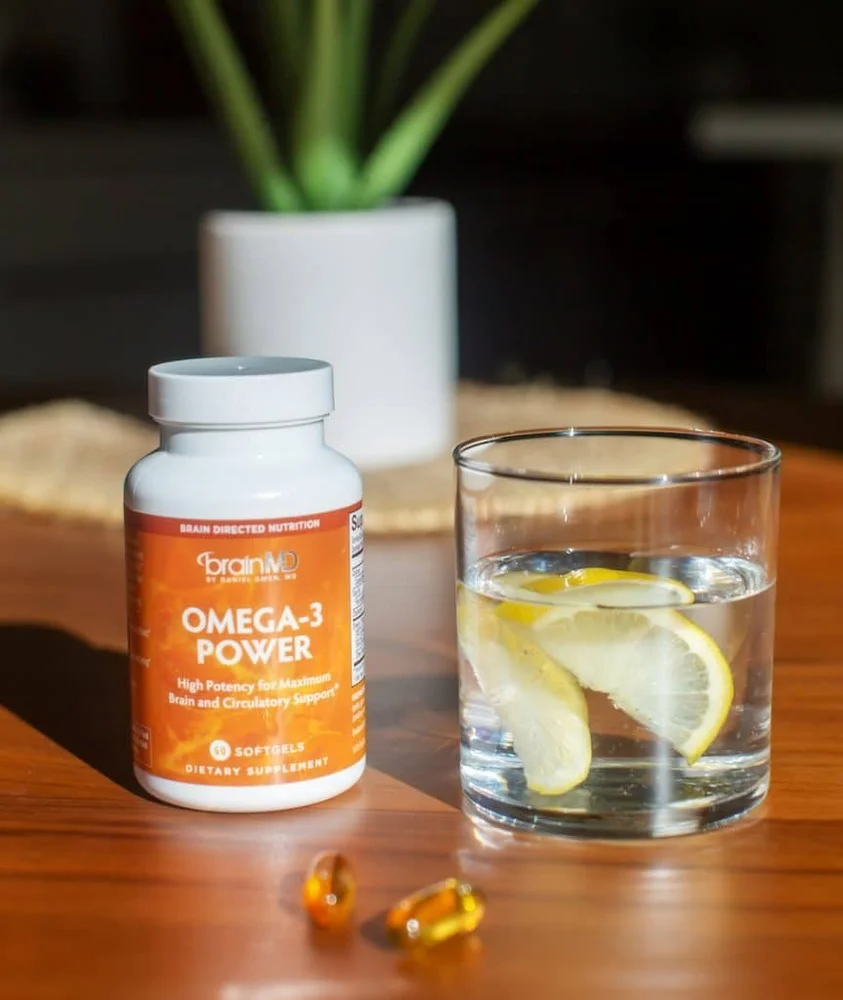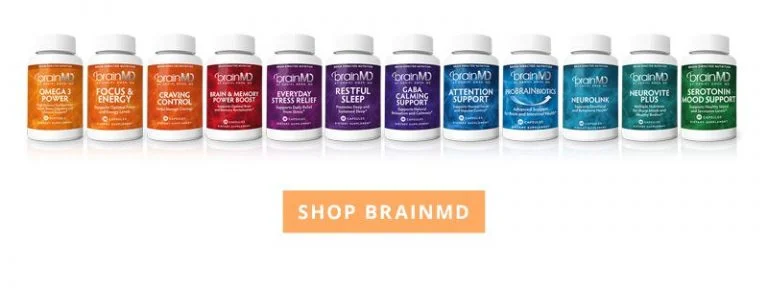Omega-3 Fatty Acids: Here Are the Facts & Latest Research
Many people know that the omega-3 fatty acids found in fish oil are good for their circulatory health. But many are unaware that these fatty acids are crucial for brain health too. When it comes to the benefits of omega-3 supplements, it supports both a healthy heart and healthy mind.
With strong evidence supporting omega-3s positive effects on the brain, heart and whole body, taking fish oil should be an essential part of your daily supplement regimen. This is especially true if you’re experiencing brain fog or memory struggles. A recent study revealed that, when combined, omega-3 fatty acids, aerobic exercise, and cognitive stimulation can prevent mild cognitive impairment and the decline of gray matter in the brain.
Whether you’re still in the research phase, or if you currently take supplements and want to find out if you’ve selected the right kind, here are some quick facts you need to know about fish oil:
Omega-3 Fatty Acid Facts
The fish oils come from cold water fish and are rich sources of long-chain omega-3 fatty acids called EPA and DHA. These are essential for human health, functioning in all our cells and way more active than the shorter-chain omega-3s that come from plants. They are practically vitamins since the body can’t make them from scratch but must get them from food.
It has been scientifically demonstrated that your brain needs these essential omega-3 fatty acids to function optimally. Unfortunately, most Americans are deficient in omega-3s, and studies indicate that as many as 90% of adults have suboptimal levels of EPA and DHA.
What are EPA and DHA?
EPA (eicosapentaenoic acid) and DHA (docosahexaenoic acid) are both critical to building the cell membranes that all our cells use to survive and carry out their functions. EPA and DHA are essential for our brain cells to make the trillions of connections that enable the brain to work at all, and for peak cognitive, mood, and behavioral performance.
The only practical way to ensure we get the recommended proper amounts of EPA and DHA we need is through foods or supplements. DHA makes up a large portion of the brain. EPA works with DHA to enable healthy blood flow to the brain, which supports memory, attention, mood and overall mental functioning. EPA and DHA work along with other fatty acids coming from our foods, to optimize the cell membrane functions of all the brain’s nerve cells AND the equal numbers of cells that provide crucial support for their information processing functions.
Deficiencies in these vital omega-3 fatty acids are associated with age-related cognitive decline, psychological disturbances, mood challenges, behavioral issues, and a broad array of other nervous system problems, as well as with issues with the circulation, joints, and other tissues and organs.
Benefits of Omega-3 EPA and DHA
The huge and rapidly-growing body of clinical research on EPA and DHA in fish oils indicates they are vital to the brain’s blood flow, its overall information processing capabilities, and memory. This also includes other cognitive functions such as mood, the brain’s “executive functioning” to make good decisions, and a calm and controlled demeanor.
Omega-3 EPA and DHA are vital nutritional support for the healthy early development, maturation, and optimal functioning of the brain, heart and circulation, and all the body’s other organs. They are also vital to the survival and optimal functioning of mind and body, across our entire lifespan.
Which Fish Oil Supplement is Best?
When searching for a high-quality fish oil supplement, keep these shopping tips in mind:
- Because toxins such as mercury, other heavy metals, solvents dioxins, PCBs, furans and in all more than 250 environmental pollutants can become concentrated in fish, it’s extremely important to choose a fish oil product that is highly purified and analyzed in the laboratory to verify that it is clean.
- Fish oil spoils easily. Look for a product that has added vitamin E, vitamin C, rosemary, or other safe and effective stabilizers. Avoid suppliers that are not reputable, because more and more fish oils are being diluted with oils that do not have omega-3 activity.
- Choose a product that has high amounts of EPA and DHA. The cheap fish oils can say “1000 mg” on the label but only provide 300 mg of EPA plus DHA, which for most people is not an adequate daily dose.
- Learn your Omega-3 Index, which is the percentage of EPA plus DHA in your body’s cell membranes. It is the only way for you to know if you’re getting enough EPA and DHA. It can cost as little as $55 online. You want to aim for an Index of between 8 and 12 percent
Omega-3-Rich Foods
Focus your diet on foods that contain omega-3 fatty acids, which are found in chia seeds, flaxseeds, walnuts, avocados and leafy green vegetables. The body can convert some of these into small amounts of EPA and DHA, but cold-water fish such as salmon, tuna, mackerel, and sardines are the sources of actual, preformed EPA and DHA. Avoid farmed salmon and try to get these and other cold-water fish from Alaska or close to the Antarctic, where the ocean waters are the least contaminated.
If getting EPA and DHA from your foods becomes a challenging task, consider a highly concentrated, purified fish oil or algal oil supplement. These will ensure you’re not getting low-grade, toxin-filled omega-3s that your body may not even be able to convert.
2 Pure & Potent Omega-3 Supplements!

OMEGA-3 POWER
Omega-3 Power is a potent fish oil concentrate that supplies substantial allowances of EPA and DHA.
- EPA- Each 2-softgel serving of Omega-3 Power delivers 860 mg of this long-chain omega-3 fatty acid. Clinical trials established EPA’s importance for attention in children and adults. Its necessity for heart and blood vessel health is undisputed.
- DHA- Each 2-softgel serving of Omega-3 Power delivers 580 mg of this long-chain omega-3. DHA is structurally essential for the nerve cells to make their functional connections and supports healthy memory, mood and overall cognition.
EPA and DHA are required for our brain’s nerve cells to make energy and to use that energy for their growth, maintenance, and repair. Since neither of these omega-3s can be efficiently made by the body, optimal intakes must come from foods and supplements.
Premium Fish Oil Without the Fishy Flavor
Sourced from pelagic (not bottom-feeders) fish species with short lifespans (so that they don’t accumulate as many toxins), the fish oil in Omega-3 Power undergoes the most advanced purification process in the supplement industry.
Omega-3 Power is tested by independent labs to ensure freshness (lack of rancidity) and for over 250 potential environmental contaminants, including mercury, lead and other heavy metals, PCBs, PBBs, dioxins, furans, and a diverse range of other organic pollutants. The oil in Omega-3 Power is also recognized by several international organizations as a sustainably managed ingredient.
VEGAN OMEGA-3 POWER
Vegan Omega-3 Power is a vegan algal oil capsule, customized for children and adults. It supplies clinically effective doses of omega-3s (700 mg EPA and 300 mg DHA), nutrients that are practically vitamins since the body can’t make them in the sufficient amounts needed to meet its requirements.
We Searched the Seas for Omega-3s
Many vegetarians supplement with flax seed, chia seed, or hemp seed oils, which contain the omega-3 ALA. But EPA and DHA, typically found in fish, are the only forms of omega-3 the body uses. It’s possible for the body to convert ALA to EPA and DHA, but it’s a difficult process.
A superior alternative to flax oil, Vegan Omega-3 Power features natural oil from marine algae – a direct source of vegan EPA and DHA. This highly concentrated formula rivals fish oil in its purity and potency.
Get all the power of fish oil without the fish!
How Much Fish Oil Should I Take?
Based on clinical research that examined how intakes of EPA and DHA improved the Omega-3 Index, we recommend that most adults take 1,400 to 2,800 mg of EPA and DHA omega-3 fatty acids a day.
Children should get at least 700 mg per 40 pounds of body weight.
If you want to remain at the top of your game, both mentally and physically, be sure to incorporate high-quality omega-3 supplements into your daily wellness regimen.
At BrainMD, we’re dedicated to providing the highest purity nutrients to improve your physical health and overall well-being. For more information about Omega-3 Power, Vegan Omega-3 Power and our full list of brain healthy supplements, please visit us at BrainMD.
- This Is What You Need to Know About HBOT
Medically Reviewed by Dr. Nicole Avena - April 22, 2024 - Hormone Changes in Men: How to Know If You Have Low Testosterone! - April 15, 2024
- This Is What You Need to Know About EMDR Therapy! - April 11, 2024






What about flax seed oil supplements? I stopped taking fish oil because I couldn’t tell if it was OK or not? I thought flax seed oil had many of the same benefits as fish oil?
As this informative article giving us some awareness about fish oil and some essential fatty acids so i would also like to suggest to read the more benefits of fish oil in terms of fish oil supplement like Physio omega 3 by physiothru which gives a human body essential faty acids , prevent the sleep deprevition ,good for nervous system and good for healthy heart etc as it contains 2400 mg(per container 30 ) fish oil .
My neuropsychologist told me that it’s better to eat foods high in omega 3’s rather than supplement because a study showed that the pill form is blocked by the blood brain barrier and does not enter the brain as it does from day, eating fish. What are your thoughts on this??? Also – don’t fish get their omega 3 from eating algae?
Keith, Thank you for your input on Omega 3; however, I do not eat fish. I use an Algae based formula.
Do you recommend any products?
Thank You,
Linda,
Thanks for your response to the Omega-3 blog. Dr. Amen believes the best source of omega-3s is from fish oil. I’m sorry that won’t work for you since you don’t eat fish, but wish you success in finding a formula that will work for you.
BrainMD Team
Looking up some things on the ‘fish oil’ bottle because I also have Intractable Epilepsy and also take another algae – Fermented Chrollea, always an hour before my medication. When I found out the fish oil contained Sodium Alginate – which I discovered comes from ‘brown seaweed’ I know now I’ll replace the fish oil I take now.
What type of tuna? Albacore?
How much DHA and how much EPA is optimal for a 60 y.o. female in good physical condition, but whose omega 6/omega 3 ratio, when tested, was very much out of balance despite a very clean diet with virtually no processed foods? I am confused the amount of EPA/DHA in different omega 3 supplements varies greatly. Thank you!
To help manage ADHD, I take 1,300mg EPA and 800mg DHA daily. Is it better to take this at a single meal or divided the dose between two or three meals?
Thank you Keith. This is one of the best and most unbiased articles I found whilst searching for Omega 3 benefits.
Learned some new stuff with very detailed information.
This post is well explained on omega 3 fatty acid supplements. Omega 3 is beneficial for our health , it helps overall our body.